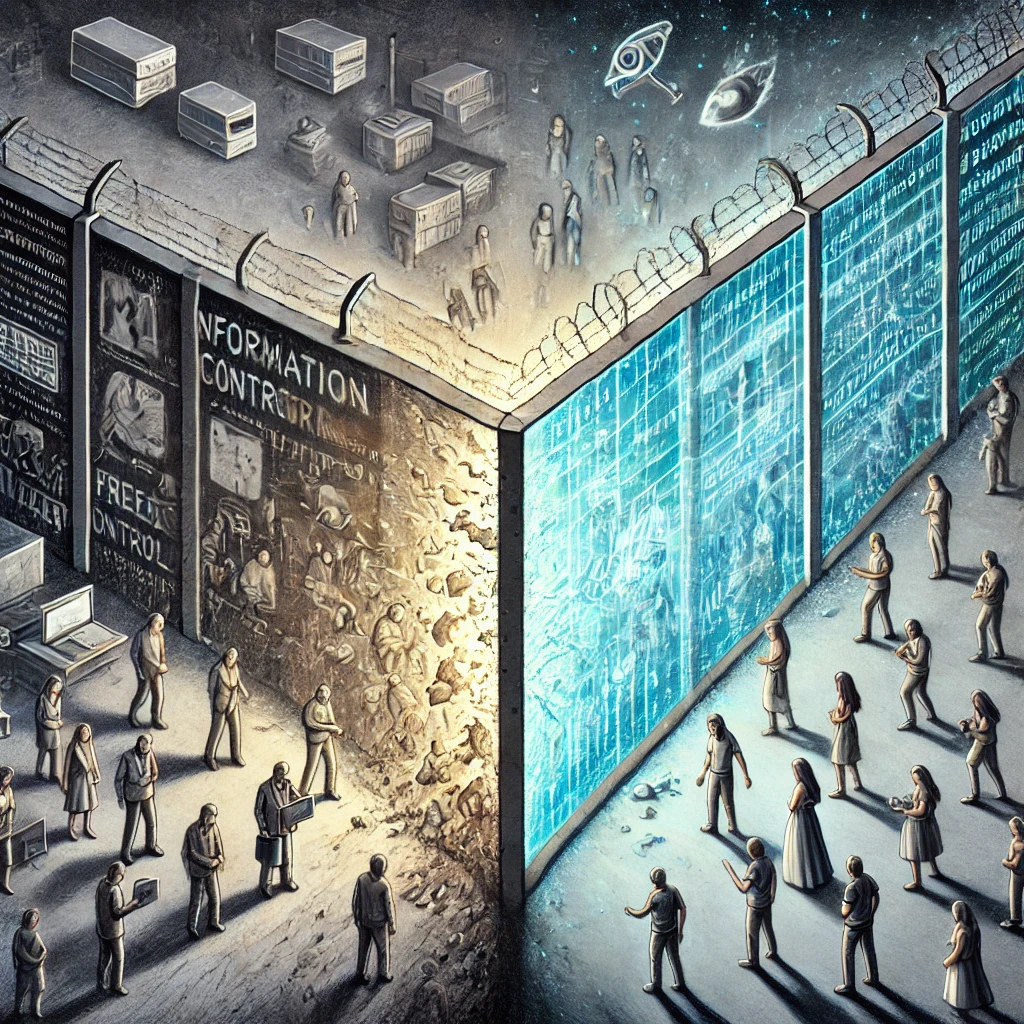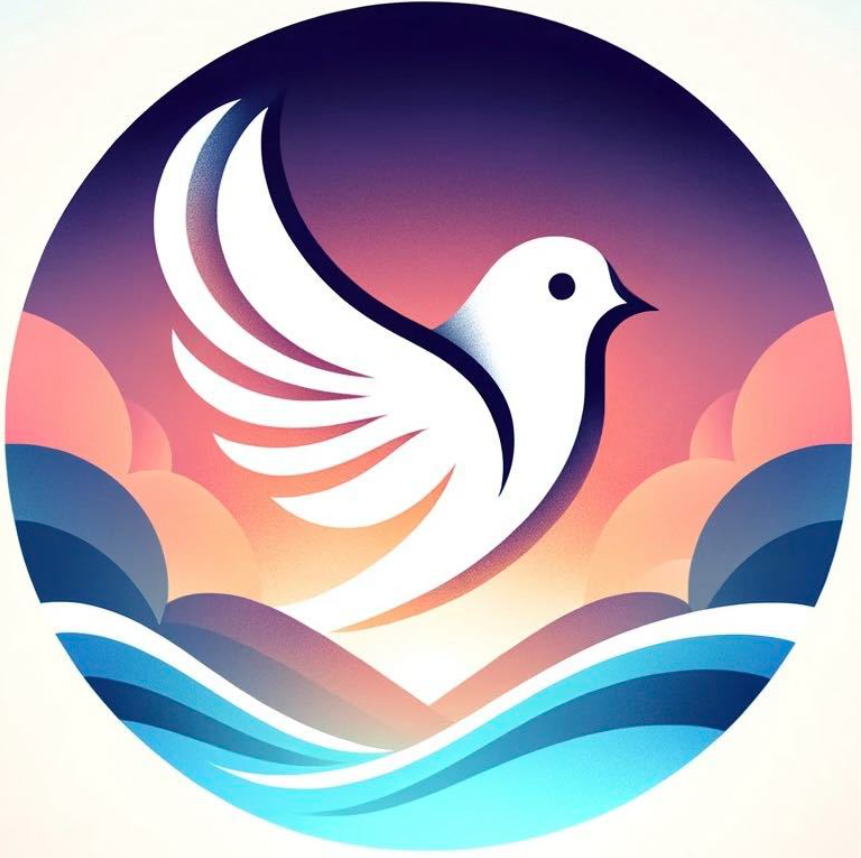墙的作用,是隔离。它可以将一个国家分裂成两个阵营,可以阻挡自由的流动,也可以让人们活在不同的世界里。柏林墙在《1984》后的第五年倒塌了,但大洋国里新的墙仍然存在,它们看不见,却摸得着,不仅横亘在国界之间,更存在于信息、思想、出入境、阶级、地域的分隔中。这些墙,比柏林墙更加隐蔽,也更加难以跨越。
然而,这些“墙”的存在,并非是无心之失,更不是“为了人民的福祉”,它们背后,是一套凌驾于宪法之上的特权指令,一套确保特定阶层掌握一切、普通人永远无法翻越的系统。宪法里写着“人民有权”,但特权系统让权利变成虚无,只是一张写满空话的纸。
在老大哥的统治下,大洋国早已超越了单纯的物理围墙,它不再需要像往昔那样依靠武力和物理封锁来控制公民的行为,而是打造了一种看不见却摸得着的信息茧房,让每个人的思想在无形的牢笼里循环往复,永远无法逃离。
在这个信息茧房里,人们的所见所闻、所思所想,都被精心设计。墙已经不需要建在国界线、城市边界,而是建在人们的意识中。每个人都活在一片被剪裁、筛选、修正的信息泡沫里,以为自己看到了世界的全部,却只是看到了统治者希望他们看到的幻象。
这堵信息之墙,比物理围墙更加坚固,也更难察觉,因为大多数人甚至不会意识到自己被关在其中。
第一章:数字防火墙——信息的单向流动
世界在互联,信息在流动,然而,有人仍被困在虚假的孤岛上。“宪法规定公民有言论自由。”然而,在大洋国现实中的网络世界里,信息自由从来不是公民的权利,而是一种特权。
老大哥深知,真正的控制不是限制身体的自由,而是限制思想的自由。因此,他创造了一种数字围墙,确保信息只进不出,只传递官方认可的内容,确保所有公民的世界观被牢牢锁定在一个特定的框架之内。
所有外部信息经过过滤,任何可能影响“社会稳定”的内容都被屏蔽,而“正确的信息”则被大规模传播。社交平台充斥着经过审查的信息,即便人们在讨论政治、经济、历史,所有的观点也只能在允许的范围内循环。翻墙成为禁忌,如果有人试图突破信息封锁,他们的行为将被记录,甚至会被视作“思想污染者”接受再教育。
而未了解外面世界的人们逐渐习惯了这种环境,认为世界本就如此,从未怀疑过自己在电视、报纸甚至是各个主流线上媒体看到的信息是否真实。他们就像生活在透明的玻璃房间里,以为自己拥有自由,却不知外面的世界早已被隔绝。流行于世界的万维网也就是world wide web,在大洋国却是weird wall web,是被老大哥扭曲的、阻隔了外部世界的内部网。

第二章:出入境审查——自由流动的幻觉
大洋国的宪法里写着“公民享有迁徙自由”,但老大哥知道,真正的自由不在于法律条文,而在于他是否允许你离开。在这片土地上,出入境的权利并非与生俱来,而是由特权系统控制。
普通公民需要繁琐的审批才能离开,而权贵阶层则早已安排好了海外资产和居留权,随时可以抽身而去。部分人即使拥有护照,也可能在机场被告知“边控”,理由不明,但事实就是,他们很难离开这片土地。护照虽然是私人证件,但体制内的很多人的护照却被老大哥派人收集保管。外部世界并非不可到达,但只有那些“被允许的人”才能踏足自由的国度。
这就像一座看不见的围墙,有人可以自由穿行,而有人只能望而兴叹。墙,看似是为了保护国家,而实际是为了控制谁能享有真正的自由,谁只能被困在牢笼里。
第三章:思想的藩篱——语言与历史的篡改
“宪法规定公民有思想自由。”但真正自由的思想,只属于少数人,而大多数人只能接受“被允许的思想”。在大洋国,历史从不以真相为标准,而是根据老大哥的需求随时调整。
普通人被灌输单一的历史叙事,受控的教育让人们无法接触到真实的历史,甚至每一次字典更新,都会删减或修改某些词汇,让人们逐渐失去描述现实的能力。
历史记录不断被重写,昨天的盟友可能成为今天的敌人,过去的失败可以被篡改为胜利,自己反抗强权政府的历史被美化,而自己人民的抗议则被镇压并定性为暴乱,而人们被训练成接受这一切。
普通人如果发表“错误观点”,可能会被审查、封号,甚至受到惩罚;而特权人士,即使发言再荒谬,也不会有任何后果。任何对官方叙述的质疑都将被标记为“错误思想”,并可能带来严重后果。
当语言被改造,思想也随之被禁锢。最终,人们不再怀疑,不再提问,他们的思想只能在官方设定的框架内运转,形成了一座思想之墙。
第四章:社会等级与不可跨越的壁垒
在大洋国,所有人表面上平等,但事实上,社会早已被划分为不同的等级,而不同等级的人只能生活在各自的世界里。即便在企业里工作,也将员工分为长期合同和短期合同,同工却不同酬。
“内党成员”享有绝对自由,他们可以接触未经审查的信息,可以自由旅行,可以享受世界上最好的教育和医疗。“外党成员”被允许在系统允许的范围内获得一定程度的福利,但他们无法跨越阶级的壁垒。“无产者”是最底层的群体,他们从不被告知世界的真实面貌,他们的生活只是为了维持整个系统的运转。
这堵墙,比柏林墙更加隐蔽,因为它不是由砖石构成,而是由身份、户籍、财富、资源的分配方式建成,让不同阶层的人活在完全不同的世界里,彼此之间永远无法跨越。
第五章:法律与现实的分裂——特权系统的至高指令
在大洋国,法律并不是为了保护公民,而是为了维持统治。“宪法规定公民的基本权利人人平等。”但在现实世界里,财富和权力决定了一切,公平只是一句空话。普通人终其一生只能在自己的阶层里挣扎,而特权阶层可以轻松享受资源、权利,甚至跨越国界,享受真正的自由。
宪法上写着公民享有言论自由,但“错误的言论”会被消除,发表这些言论的人会被惩罚。宪法上写着司法独立,但真正的判决由老大哥及党内高层决定,法院只是执行机关。宪法上写着人人平等,但在特权系统下,不同等级的人拥有不同的权利,某些人即便触犯法律也能免于惩罚。
法律的作用,只是让人们以为他们仍然受到法律的保护,而真正的决定权,永远掌握在少数人手中。
尾声:信息茧房里的囚徒
在这座巨大的信息茧房里,人们看不见围墙,但他们的世界早已被精心设定。他们以为自己自由地获取信息,却不知道信息是被筛选过的。他们以为自己拥有迁徙权,却不知道真正的自由只属于特权阶层。他们以为法律会保护他们,却不知道法律只是一道装饰性的门面。他们以为世界就是这样,却不知道真实的世界远比他们想象得更加广阔。
在《1984》,大洋国已经成为了一个封闭而绝对的社会。如今,它不需要实体的“柏林墙”,因为它已经在每个人的思想中建起了一座更高、更牢固的墙。这堵墙,看不见,却摸得着。它存在于每一次信息审查,每一次历史改写,每一次思想禁锢,每一次权利剥夺之中。它是世界上最坚固的监狱,囚禁着整个大洋国的人们,让他们永远不敢怀疑,不敢突破,不敢离开。
----《1984》的故事仍未结束,大洋国的信息茧房仍然屹立不倒....,但这茧房必将倒塌,很快。
Imagine Orwell Continuing to Write 1984: Special Edition on Oceania’s Ideological Berlin Walls
The function of a wall is to separate. It can divide a nation into two camps, block the flow of freedom, and cause people to live in entirely different worlds. Although the Berlin Wall fell five years after the events of 1984, new walls remain in Oceania. They are invisible yet palpable—not only spanning national borders but also existing as separations in information, thought, entry and exit, class, and regional divisions. These walls are even more covert and harder to cross than the Berlin Wall.
However, the existence of these “walls” is not accidental, nor are they purportedly erected “for the sake of the people’s welfare.” Behind them lies a set of privileged edicts that reign above the constitution, ensuring that power remains exclusively in the hands of a select few while ordinary people are forever unable to climb over. Although the constitution proclaims that “the people have rights,” the privileged system reduces those rights to empty words on a piece of paper.
Under Big Brother’s rule, Oceania has long transcended the notion of physical walls. It no longer needs to rely on brute force or physical blockades to control its citizens; instead, it has constructed an invisible “information cocoon” that keeps everyone’s thoughts confined within an intangible prison from which they can never escape.
Within this information cocoon, what people see, hear, and even think is all carefully pre designed. There is no longer any need to build walls along national or city borders; instead, they are built in people’s minds. Everyone lives in a curated, filtered, and revised bubble, believing they see the whole world, while in reality, they only see the illusions that the rulers want them to see.
This wall of information is far more impregnable than a physical barrier—and it is even less noticeable because most people do not even realize that they are confined within it.
Chapter One: Digital Firewalls – The One-Way Flow of Information
Though the world is interconnected and information flows freely elsewhere, in Oceania many remain trapped on a false island. The constitution states that “citizens have freedom of speech.” However, in Oceania’s online world, information freedom is never a right for the public but a privilege reserved for a select few.
Big Brother understands that true control does not lie in restricting physical liberty but in limiting the freedom of thought. Therefore, he has created a digital wall that guarantees information flows in one direction only—passing only official, sanctioned content—so that every citizen’s worldview is locked into a specific framework.
All external information is filtered; any content that might disrupt “social stability” is blocked, while “correct information” is disseminated on a massive scale. Social media platforms are filled with approved data, and even when people discuss politics, economics, or history, all viewpoints remain confined to an acceptable range. “Circumventing” these walls becomes taboo, and anyone attempting to break through the information blockade will have their behavior recorded and be labeled an “ideological contaminator,” subject to re education.
Those who have never experienced the outside world gradually become accustomed to this environment, never questioning whether the information seen on TV, newspapers, or mainstream online media is genuine. They live as if inside a transparent glass box, believing they are free when in fact the outside world has long been severed from them. (The World Wide Web, for example, in Oceania has become the “Weird Wall Web” – a twisted, internal network that blocks access to the external world.)

Chapter Two: Border Control – The Illusion of Free Movement
The constitution of Oceania declares that “citizens have the freedom to travel.” Yet Big Brother knows that true freedom is not determined by legal text but by whether he allows you to leave. On this land, the right to cross borders is not innate but controlled by a privileged system.
Ordinary citizens must go through cumbersome approvals in order to leave, while the elite have already arranged overseas assets and residence permits, enabling them to leave at a moment’s notice. Even if some possess passports, they might be stopped at airports with a vague “border control” explanation—in essence, only those “authorized” are permitted to step into the realm of freedom.
It is akin to an invisible wall: some may travel freely, while others can only look on longingly. The wall appears to be for national protection but, in reality, is designed to control who can truly enjoy freedom and who is doomed to remain confined.
Chapter Three: Barriers of Thought – The Distortion of Language and History
The constitution proclaims that “citizens have freedom of thought.” Yet, in truth, free thought belongs to only a few; most people are confined to “approved thoughts.” In Oceania, history is never measured by truth but is altered at Big Brother’s whim.
Ordinary citizens are indoctrinated with a single historical narrative, and a controlled education system deprives them of access to the real history. Even each time the dictionary is updated, certain words are deleted or modified, gradually robbing people of the language to describe reality accurately.
Historical records are rewritten continuously. Yesterday’s allies may become today’s enemies; past failures can be transformed into victories. Acts of resistance against the government are glorified, while widespread protests are suppressed and labeled as riots, all the while citizens are trained to accept these distortions.
Should an ordinary person express an “incorrect opinion,” they may be censored, banned, or punished—whereas privileged individuals, no matter how absurd their statements, face no consequences. Any questioning of the official narrative is marked as “erroneous thought” and may incur severe punishment.
When language is manipulated, thought itself is imprisoned. Ultimately, people cease to doubt or ask questions—their thoughts can only operate within the rigid framework set by the authorities, forming a wall of ideas.
Chapter Four: Social Hierarchies and Impenetrable Barriers
In Oceania, while everyone appears equal on the surface, society is in fact divided into distinct classes, and people in different classes live in entirely separate worlds. Even within companies, employees are stratified into long term and short term contract holders, yet receive unequal compensation.
Members of the “Inner Party” enjoy absolute freedom—they have access to uncensored information, can travel freely, and enjoy the best education and healthcare available worldwide. “Outer Party” members are granted limited welfare benefits within the system’s confines, but they cannot break through the class barriers. The proletariat, the lowest group, is never allowed to see the truth of the world; their lives exist solely to keep the system running.
This wall is far more concealed than the Berlin Wall because it is not constructed of bricks and mortar but rather is built from the distribution of status, household registration, wealth, and resources—ensuring that people from different classes live in completely separate worlds that they can never cross.
Chapter Five: The Divide Between Law and Reality – The Ultimate Edict of the Privileged System
In Oceania, the law is not meant to protect citizens but to sustain the regime. The constitution proclaims that all citizens’ basic rights are equal, but in reality, wealth and power determine everything, and fairness is nothing more than an empty phrase. Ordinary people struggle within their own classes all their lives, while the privileged not only enjoy resources and rights effortlessly but can even cross national borders to enjoy real freedom.
Although the constitution states that citizens enjoy freedom of speech, “erroneous speech” is eliminated and its speakers are punished. The constitution further guarantees judicial independence, yet true judgments are determined by Big Brother and high ranking party officials—the courts simply serve as executioners. While the law declares equality, under the privileged system, different classes enjoy different rights. Some, even if they break the law, are spared punishment.
Thus, the role of the law is only to give the illusion of protection, while real decision making power always remains in the hands of a few.
Epilogue: Prisoners in the Cocoon of Information
Inside this vast cocoon of filtered information, people do not see the walls, yet their world is meticulously designed. They believe they are accessing free information, unaware that what they see is heavily curated. They think they have the right to travel, yet true freedom is reserved solely for the privileged. They believe the law will protect them, but in reality, the law is nothing more than a decorative façade. They assume the world is as it appears, but the true world is far broader than they ever imagine.
In 1984, Oceania became a closed and absolute society. Today, it no longer needs a physical “Berlin Wall” because, within each person’s mind, an even higher and more unyielding wall has been constructed. This wall is invisible yet tangible. It exists in every instance of information censorship, every act of historical rewriting, every imposition on thought, and every deprivation of rights. It is the strongest prison in the world, confining all the people of Oceania so that they never dare to question, never dare to break free, and never dare to leave.
The story of 1984 is not over, and the cocoon of information in Oceania still stands… but that cocoon will soon collapse.
